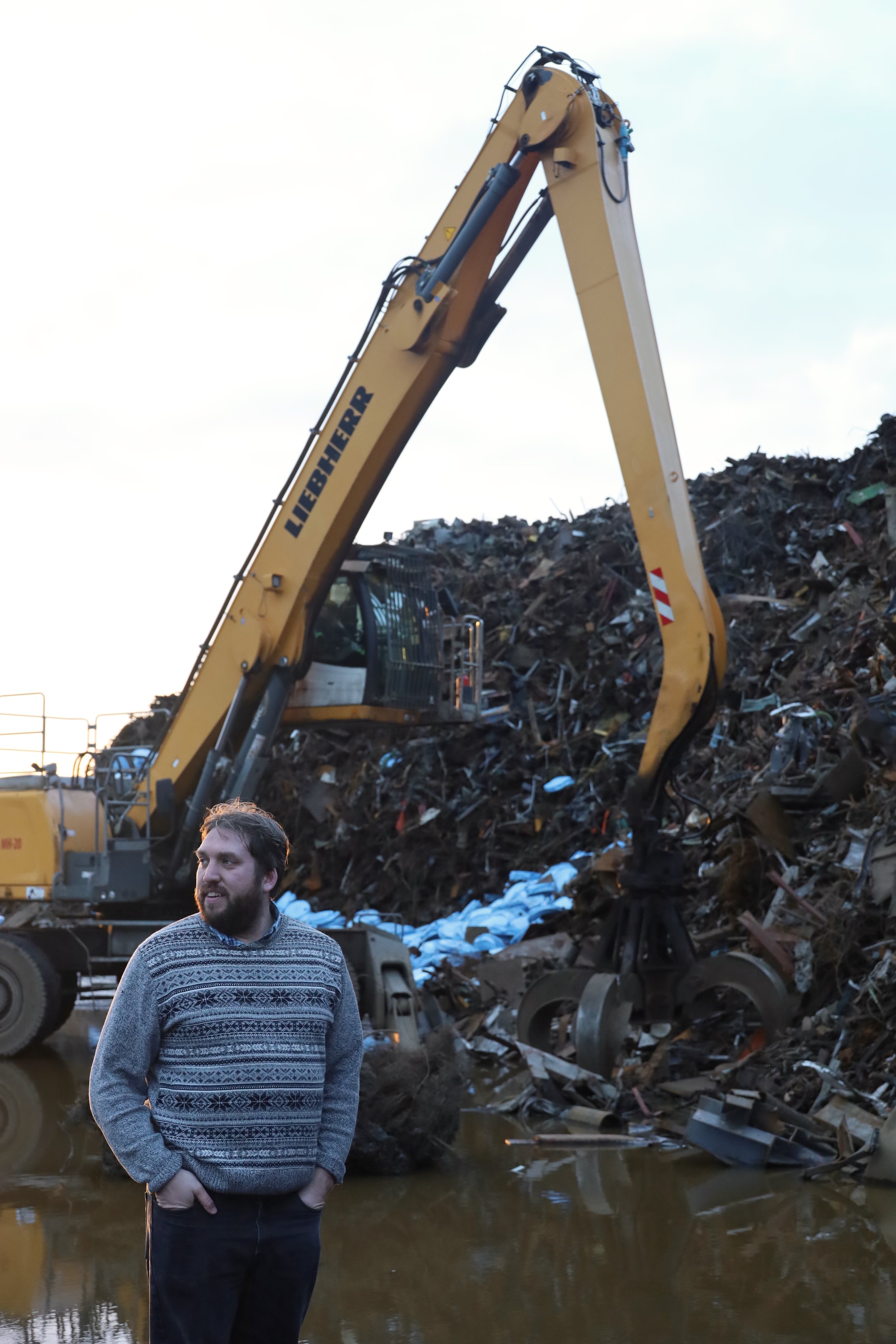Clashing Metal and Community
ABC Recycling, a Canadian metal recycling company, plans to build an industrial metal shredder on a 20-acre property along Marine Drive, just south of the Birchwood neighborhood in Bellingham. Residents are concerned about potential health and environmental impacts of the shredder and are working to prevent its development.
An excavator lies still after a day of work, and heaps of metal towers behind it. // Photo by Reid Hunter
Story by Sophie Reif || Photos by Reid Hunter
December 4, 2023
May 8, 2024: Since this story was written, the Port of Bellingham voted to end their contract with ABC Recycling due to several contract violations, including mooring a ship in an unauthorized location. ABC must remove their metal from the waterfront by June 30, or risk a fine of $1,000 a day. Additionally, the company released the following statement in April: “ABC Recycling would like to hereby withdraw its application for permits for the development of its property located at 741 Marine Drive, Bellingham, WA.” The permit for the proposed metal shredder this story addresses is no longer under consideration. The editing team decided to publish this story in the anthology as well as update the original online edition as a record of the capability of community organizing to effect change.
Waves slosh against the shore of Bellingham Bay, creating patterns of ripples as the wind moves along the surface of the water. Seagulls can be heard crying overhead, scanning the shore for their next meal. At the shipping terminal, just feet away, large piles of rusted dirty scrap metal sit out in the sun, waiting to be shredded. A shipping barge roars into the bay, bringing with it the sharp smell of fuel.
ABC Recycling, a Canadian metal recycling company, has a shipping terminal in Bellingham Bay that receives cargo ships brimming with scrap metal pieces every six to eight weeks.These scraps are then unloaded by longshoremen in excavators and sorted into piles on the property where they wait to be recycled into reusable materials.
ABC now has plans to build an industrial metal shredder just south of the Birchwood neighborhood. The shredder would take the scrap metal from the shipping terminal and turn it into smaller, easier to transport pieces of metal. The 20-acre property along Marine Drive will allow ABC to expand its recycling operation even further.
Riley Sweeney, ABC Recycling’s community relations manager, is excited about the expansion of the company in Bellingham.
Riley Sweeney, ABC Recycling's Community Relations Manager, stands in ABC's log pond. Here, the pieces of scrap metal are brought in by barge and stored until they are recycled. Behind him, an excavator picks up metal and sorts the scraps into piles according to their size. // Photo by Reid Hunter
“There are no shredders in Whatcom, Skagit or Snohomish. That’s a big opportunity to process the materials that we are producing locally,” Sweeney said.
The first step of the metal recycling process takes place down at ABC’s shipping terminal, where the pieces of scrap metal are unloaded and sorted using heavy machinery. This is a noisy process that produces metallic clanging which can be heard into the night and early morning.
“It’s like sound doesn’t disappear as you go further and further away from the terminal,”
Scott Jones, president of the South Hill Neighborhood Association, said. The South Hill neighborhood sits just north of ABC’s shipping terminal and many residents have complained about the noise.
ABC’s development in Bellingham has turned the waterfront into an industrial wasteland, according to Jones. The Port of Bellingham has begun to revitalize their shipping terminal, which leases space for docking and storage to maritime industries. ABC Recycling leased an almost 6 acre spot in December of 2020, one of the first since the closing of the Georgia-Pacific’s Pulp, Paper and Chemical Plant in 2001.
The Port’s Environmental Compliance Assessment Program ensures that tenants are operating under local, state and federal environmental regulations through Port officials’ consistent monitoring.
“We evaluate different tenants and their operations and bring in specialists in different fields to help make sure that our tenants are in compliance,” Michael Hogan, the public affairs administrator at the Port of Bellingham, said.
According to the Port, ABC’s partnership provides longshore job opportunities and supports economic growth in Whatcom County, all while remaining in compliance with environmental regulations. This development, however, comes with an increase in traffic on the streets of Bellingham.
Trucks will transfer the metal up to the Marine Drive shredder after it is delivered to the terminal. ABC anticipates that three to five of these large trucks, filled to the brim with scrap metal, will be needed per hour.
Many residents neighboring the shredder are concerned about the impacts it could have on their quality of life and environment.
Sarah Gardner, president of the Birchwood Neighborhood Association, advocates for her community. They would bear the most direct impacts from the shredding operation, whose proposed site is just a five minute drive from Birchwood proper. One common byproduct of metal shredding is volatile organic compounds, or VOCs. These are toxic gasses that are produced when heat from a grinding metal shredder interacts with non-metal materials within the scraps.
“The fumes are horrible, even if it is contained in a state of the art facility, there are still some of those VOCs that get released,” Gardner said.
In addition, Gardner worries about prevailing winds that could carry dust from the shredder towards neighboring schools, which are less than a mile away from the Marine Drive property.
Birchwood is known for being one of Bellingham’s most diverse neighborhoods. Eleven percent of its population is made up of Latin American residents, eight percent of residents are Asian and almost two percent are Black.
Studies have shown that Black, Indigenous and People of Color tend to live closer to industrial areas, and face the negative health impacts of pollutants more often than whiter and wealthier neighborhoods. Breathing in toxic byproducts like VOCs from nearby facilities can result in irritation of the throat, nose and eyes and can damage the central nervous system when there is consistent exposure.
ABC is aware that toxic byproducts are a frequent issue in the metal recycling process, and they are dedicated to reducing their impact. Sweeney has heard almost all of the shredding horror stories and wants to reduce fears among residents.
“There is a lot of fear and misinformation that is circulating,” Sweeney said. “Let’s discuss the facts, not the fears.”
To combat industry pollutants, metals are depolluted by scrap yards before they are processed by ABC. This aims to ensure that the metal pieces do not contain any materials that could produce toxic byproducts when shredded. Scrap yard staff drain hazardous fluids and remove batteries in old vehicles, a common scrap ABC receives.
“The best thing we can do to control emissions is to have good control in our scrap yard,” Sweeney said. “We are going to make sure that the material is inspected and depolluted before it arrives.”
Once pollutants are found and removed, the soon to be recycled metal is then dismantled into smaller, more manageable pieces for transport.
One of multiple scrap piles at the shipyard. An assortment of items make up these large piles, from rusty car parts to industrial manufacturing materials. // Photo by Reid Hunter
To further control emissions, ABC plans to adjust its shredder’s operation to comply with the Environmental Protection Agency’s national alert issued in 2021. The alert informed metal shredder operations around the country about Clean Air Act requirements and recommended various mitigation strategies to reduce toxic byproducts.
“It will be enclosed, it will be depolluted, which will contain the emissions and the noise,” Sweeney said of the shredder. “ABC Recycling has a strong environmental and safety record and we are going to live up to those standards.”
While ABC confidently advertises itself as an environmentally friendly company, residents still have concerns about the impacts of the shredder and have gone to the county for solutions.
On Oct. 24, the Whatcom County Council considered a proposed moratorium, which would have temporarily postponed all permitting in Bellingham’s industrial zones. Despite the overwhelming attendance of concerned Birchwood residents, the moratorium did not pass.
“The moratorium was going to allow us time to have discussions with the planning department,” said Gardner. “We would all be able to talk about it and make sure that the neighborhood’s safety was in consideration.”
It is now up to the Birchwood neighborhood to compile resources and submit a burden of proof to Whatcom County council members. This would provide evidence of toxic pollutants or impacts resulting from the operation of the shredder. This process could take years to complete, as it requires proper funding to hire environmental specialists and garner enough public support to potentially challenge the shredder’s operation.
The Marine Drive property is under heavy industrial zoning, which legally allows ABC to operate as a heavy industrial facility. Birchwood residents are aware that their community borders this type of zoning.
“They [ABC] are going to grow - and they are going to grow fast,” Gardener said. “At this zoning, they are within their legal right to do so, which is part of the problem.”
Regardless of community concerns, ABC plans to build its shredder in 2025.
“When you do it right, metal shredding is a safe and responsible part of the recycling industry,” Sweeney said. “We’re here to be engaged, to be good neighbors, and to be good partners - and we’re just beginning.”
Sehome Hill and Western Washington University stand behind a pile of scrap-metal. Noise pollution from the work here has raised concern among Bellingham residents near the bay. // Photo by Reid Hunter
Sophie Reif is a sophomore in environmental studies at Western. She is a passionate environmental advocate who is interested in exploring the impacts that communities can have on their surrounding natural environments.
Reid Hunter is a sophomore at Western with a passion for portraying the fragile beauty and importance of nature through his photography.




